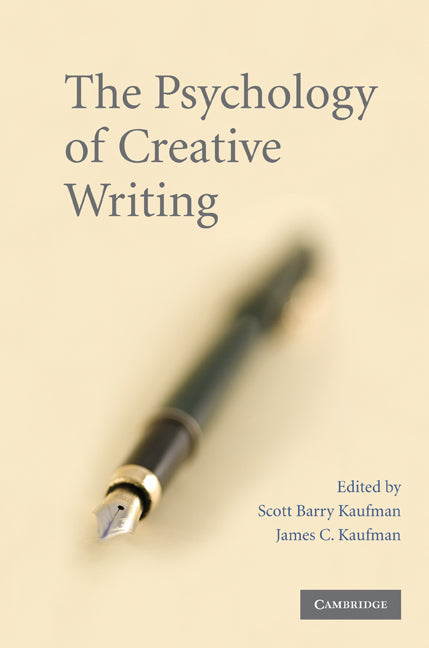Freshly Printed - allow 6 days lead
Couldn't load pickup availability
The Psychology of Creative Writing
The Psychology of Creative Writing takes a scholarly, psychological look at multiple aspects of creative writing.
Scott Barry Kaufman (Edited by), James C. Kaufman (Edited by)
9780521707824, Cambridge University Press
Paperback, published 22 June 2009
406 pages, 7 b/w illus. 8 tables
22.8 x 15.4 x 2.1 cm, 0.55 kg
'This book is well worth a read because it's interested in explaining what writers do rather than explaining it away, which is the tendency in literary theory.' Writing in Education
The Psychology of Creative Writing takes a scholarly, psychological look at multiple aspects of creative writing, including the creative writer as a person, the text itself, the creative process, the writer's development, the link between creative writing and mental illness, the personality traits of comedy and screen writers, and how to teach creative writing. This book will appeal to psychologists interested in creativity, writers who want to understand more about the magic behind their talents, and educated laypeople who enjoy reading, writing, or both. From scholars to bloggers to artists, The Psychology of Creative Writing has something for everyone.
Part I. The Writer: 1. The Personalities of Creative Writers Jane Piirto
2. Killing Your Babies: The Creative Writer, Locus of Control, and Rumination E. M. Skrzynecky and James C. Kaufman
3. 'The more I write, the better I write, and the better I feel about myself': Mood Variability and Mood Regulation in Student Journalists and Creative Writers Adèle Kohanyi
4. Characteristics of Eminent Screenwriters: Who Are Those Guys? Steven R. Pritzker and David McGarva
5. The Tears of a Clown: Understanding Comedy Writers Scott Barry Kaufman and Aaron Kozbelt
Part II. The Text: 6. The Evolution of Creative Writing Daniel Nettle
7. Literary Creativity and Physiognomy: Expressiveness in Writers, Readers, and Literature Martin S. Lindauer
8. The Literary Genius of William Shakespeare: Empirical Studies of His Dramatic and Poetic Creativity Dean Keith Simonton
Part III. The Process: 9. In search of the writer's creative process Todd Lubart
10. Writing as a collaborative act R. Keith Sawyer
11. Writing as an interaction with ideas Mark A. Runco
12. Creative Cognition in Science Fiction and Fantasy Writing Thomas B. Ward and E. Thomas Lawson
Part IV. The Development: 13. Writing in flow Susan K. Perry
14. Writers' Blocks and Blocked Writers: Using Natural Imagery to Enhance Creativity Jerome L. Singer and Michael V. Barrios
15. Pretend Play, Emotional Processes, and Developing Narratives Sandra W. Russ
16. The Healing Powers of Expressive Writing Janel D. Sexton and James W. Pennebaker
Part V. The Education: 17. How Rewards and Evaluations Can Undermine Creativity (and How to Prevent This) John Baer and Sharon S. McKool
18. Teaching Writing by Demythologizing Creativity Grace R. Waitman and Jonathan A. Plucker
19. Creation and Response: Wellspring to Evaluation Genevieve E. Chandler and Pat Schneider
20. Fostering Creative Writing: Challenges Faced by Chinese Learners Ai-Girl Tan
21. Putting the Parts Together: An Integrative Look at the Psychology of Creative Writing Scott Barry Kaufman and James C. Kaufman.
Subject Areas: Educational psychology [JNC], Education [JN], Literary theory [DSA]


